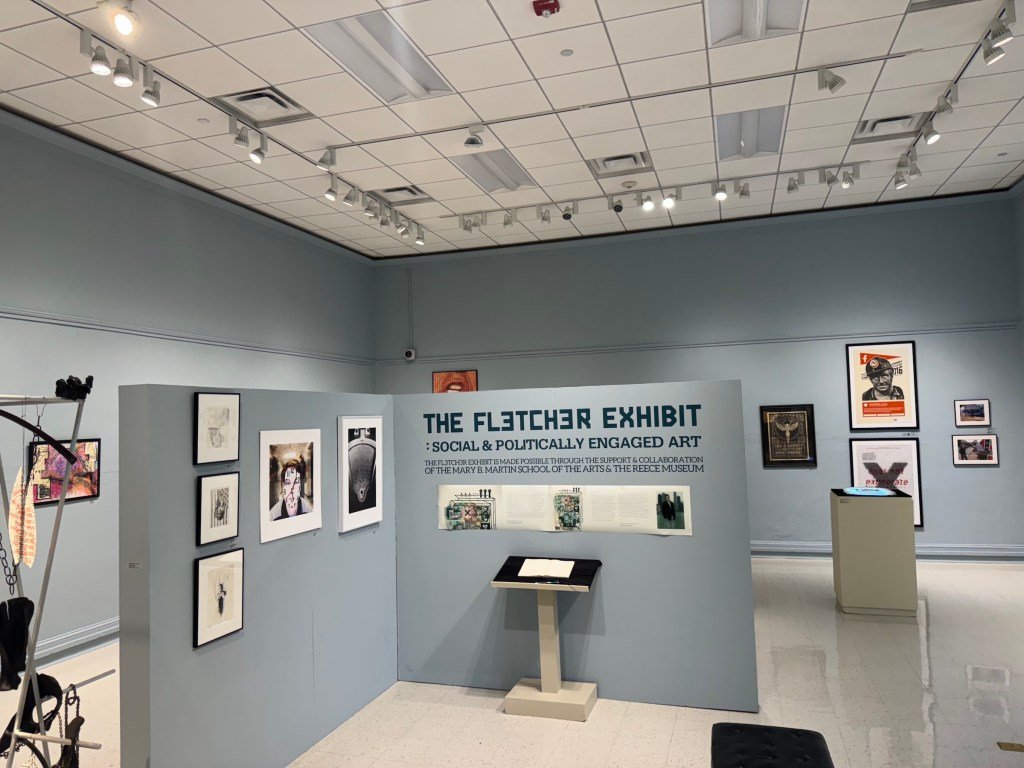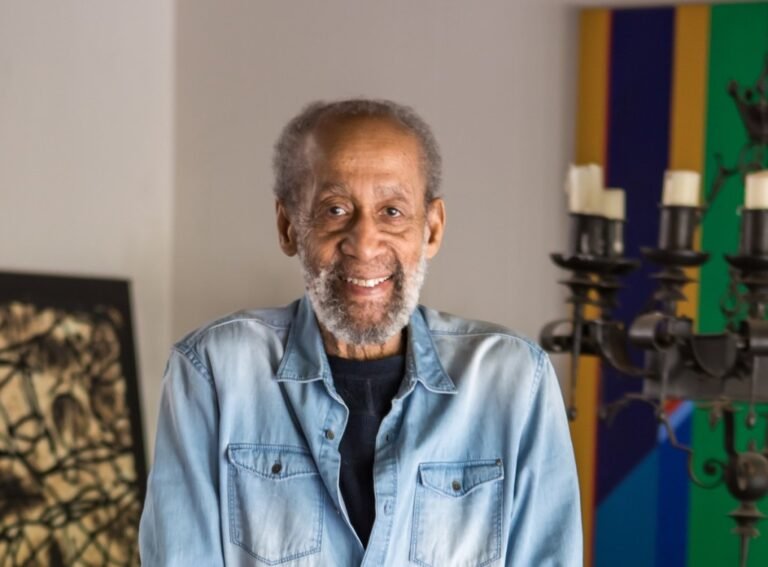

A long-running art exhibition of political artwork at East Tennessee State University (ETSU) was not invited to return to the school this year after a wave of right-wing backlash, including from a Tennessee chapter of Turning Point USA.
The Fletcher Exhibit of Social and Politically Engaged Art, held annually at ETSU’s Reece Museum since 2013, came under intense scrutiny from conservatives during and after the November 2024 presidential election. The show has been organized by the family of Fletcher Dyer, who was an art student at ETSU when he died in a tragic accident in 2009, for over a decade.
Months before the assassination of Turning Point USA founder Charlie Kirk, the 2024 iteration of the Fletcher Exhibit triggered condemnation from the organization’s ETSU chapter for artworks that criticized conservative figures. One work that included Kirk’s likeness in a collage criticizing right-wing figures and hate symbols was called out in national conservative news outlets last November. Another work, which depicted Mitch McConnell against a background of swastika symbols that evolved into crosses, was published on the conservative site Campus Reform.

Individuals who spoke to conservative media said the artworks espoused rather than criticized hateful views, and in November 2024, elected Republican officials in Tennessee demanded that the artwork be removed from the public university. After a torrent of local and national attention, the university began asking visitors to sign a liability waiver to view the exhibition. This summer, the show’s organizers learned that the school would not host its future iterations.
The Dyer family rejects the media characterization of their show as hateful. In a phone call with Hyperallergic, Barb Dyer, Fletcher Dyer’s mother, described the exhibition as a way for people in the Appalachian region to “understand the concerns and worries of people internationally in social and politically engaged events.” Her son always believed in the importance of debate, free speech, and publicly expressing one’s emotions, Barb said.
In February, months after the exhibition closed, Barb Dyer received a call from a staff member of the Reece Museum, she said. She recalled being told that the museum would no longer host the exhibition because the university’s “goals no longer coincided with our goals.” Barb said she asked the museum for an explanation in writing, but never received one. The 2025 exhibition would have likely opened next month.
“There’s a level of feeling betrayed by an entity that should have supported us, and Fletcher, and freedom of speech and freedom of expression,” Carrie Dyer, Fletcher’s sister, told Hyperallergic in a phone call.
Over the summer, Joel Gibbs, the artist who created “Evolution” (2024), the artwork featuring Mitch McConnell that was targeted by conservatives, asked a staff member at the Reece Museum via email whether there would be a Fletcher Exhibit this year.
“The decision was made that the Reece would no longer be the host of the exhibition moving forward,” the Reece staff member said in a response to Gibbs reviewed by Hyperallergic.
Gibbs told Hyperallergic in an email that he sees the school’s decision to stop hosting the exhibition as a “symptom” of university capitulation to demands of Trump-aligned officials.
Media contacts for ETSU have not yet responded to Hyperallergic’s requests for comment.

Beyond their concerns over what ETSU’s decision to no longer hold the exhibition means for freedom of expression, Barb and Carrie Dyer told Hyperallergic that the institution’s rejection of the show was deeply personal for them. Fletcher was in his last semester of college at ETSU when he died; Barb and Carrie graduated from the institution, and Wayne, Fletcher’s father, is a professor emeritus of the university. The family also established the Fletcher H. Dyer Memorial Scholarship, awarded annually to an ETSU art and design student.
“In some ways, for me, it feels like Fletcher has died again, when the exhibit was stopped,” Carrie said. “It felt like a second death for me.”
The family has not yet found an alternative venue for their exhibition, but is exploring options for how to keep the show running.
ETSU’s Chapter of Turning Point USA was one of the first groups to criticize the show, condemning a portrayal of Kirk in the exhibition on its Instagram account last November.
“We still believe in the right to share those thoughts openly and not be murdered for them,” Carrie said. The family condemned Kirk’s killing.
“Fletcher wouldn’t have been okay with what happened to him, even though they did everything they could to stop the exhibit,” Carrie said.
The university has reportedly suspended two faculty members over social media posts related to Kirk. ETSU’s Turning Point USA chapter did not respond to a direct message to their Instagram account requesting comment. Hyperallergic has contacted the national Turning Point USA organization for comment.

Hyperallergic spoke to several artists and jurors from across the country who participated in the show, and who noted that the exhibition was an opportunity to display thought-provoking work. Each spoke glowingly of the Dyer family’s desire to honor their son’s legacy.
One artist, Jason Flack, who is based in Johnson City, where the university is located, lamented the show’s discontinuation in an email to Hyperallergic. Flack exhibited work in the show for four years and knew Fletcher personally. The loss of the exhibition was “a big deal,” he said, describing the local art scene as “very underground, scattered, often poorly promoted, and easily dismissed.” The Fletcher Exhibit had brought together artists of all educational backgrounds and experience levels, Flack said.
He described the work he submitted over the years as holding a “mirror to society,” reflecting the areas he was raised in, which he described as “the poor and the Black and brown neighborhoods of my hometown.” Flack’s two-part painting “Culture Crisis” (YEAR) in the last edition examined “what is accepted and ignored in today’s so-called Black culture,” he explained.
Artist Patricia Anderson-Turner, who is based in Florida, participated in the exhibition for 10 years. In a phone call, Anderson-Turner described the event to Hyperallergic as intimate and community-forming. Last year, Anderson-Turner exhibited a work commenting on the destruction of Palestinian olive trees as a metaphor for the “obliteration of Palestine” by Israeli settlers, according to an artist statement. Her works from prior years addressed the 1911 abduction and lynching of Laura and L.D. Nelson, and another contended with the January 6 insurrection.

Meghan Dee, the juror of the scrutinized 2024 edition, told Hyperallergic that the show had previously presented politically charged material, but this was the first year that it sparked such an outcry.
“What we lost is another space, another community, another place for artists to connect and share work. We also lost some of our freedom of speech,” Dee said. “I never thought the role of art was that everyone ‘liked’ it or that everyone ‘agrees’ with it. Good art often provokes discussion and is controversial.”
Artist Sue Coe, who has served as a judge for previous iterations, said the show was an opportunity to show work that may not otherwise be uplifted in the traditional art world context.
“It means a lot to artists who struggle with so little support, because they are not for sale or valued in the corporate marketplace to see their work in a museum,” Coe said.
“All the positive things that came from the Fletcher Exhibit cannot be cancelled by the turn of the tides,” Coe continued. “It was the perfect venue to honor Fletcher and his belief that art can help humanity.”


